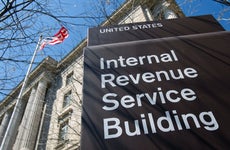Claim car repair costs due to a pothole?

The Bankrate promise
At Bankrate we strive to help you make smarter financial decisions. While we adhere to strict , this post may contain references to products from our partners. Here's an explanation for .
Dear Tax Talk,
Can I deduct the cost of a repair to my car that was not covered by my insurance company? The cost was in excess of $900 and was the result of a major pothole on the Interstate 270 in Ohio. When we notified the state, we were told that the pothole was the paving contractors’ to fix and that they were the ones to pay for the damage. However, we got a three-page letter citing laws passed long ago, stating that they would not have to pay.
More On Claiming A Loss:
Can we claim car repair costs due to a pothole? A total of 27 people hit that thing and nobody takes responsibility. We are on fixed income and that $900 hurt. Thanks.
— Robert
Dear Robert,
This sounds like a very frustrating situation for you to resolve and I hope this information is helpful to you.
The IRS generally allows deductions for casualty and theft losses involving your vehicles, home and household items. Any insurance reimbursements would reduce the amount of your loss.
The IRS considers a casualty loss to be a sudden, unexpected or unusual incident such as a flood, earthquake, hurricane, fire and other natural disaster. But it also includes car accidents if your willful actions did not cause the loss, or in your case, damages from an unexpected pothole.
You will need to complete Form 4684, Casualties and Thefts, to claim the deduction. But here are the limitations on the loss you can claim: First, you have to reduce your loss by $100, and then your claim is only deductible to the extent it exceeds 10 percent of your adjusted gross income. Finally, if you have an amount left to deduct at this point, it is claimed on Schedule A, line 20 as a casualty loss.
Keep in mind, you have to be itemizing your deductions in order to receive any benefit at this point, and you may still be better off taking the standard deduction instead.
Thanks for your question.
Ask the adviser
To ask a question on Tax Talk, go to the “Ask the Experts” page and select “Taxes” as the topic. Read more Tax Talk columns.
To ensure compliance with requirements imposed by the IRS, we inform you that any U.S. federal tax advice contained in this communication (including any attachments) is not intended or written to be used, and cannot be used, for the purpose of (i) avoiding penalties under the Internal Revenue Code or (ii) promoting, marketing or recommending to another party any transaction or matter addressed herein. Taxpayers should seek professional advice based on their particular circumstances.
Bankrate’s content, including the guidance of its advice-and-expert columns and this website, is intended only to assist you with financial decisions. The content is broad in scope and does not consider your personal financial situation. Bankrate recommends that you seek the advice of advisers who are fully aware of your individual circumstances before making any final decisions or implementing any financial strategy. Please remember that your use of this website is governed by Bankrate’s Terms of Use.
Related Articles


Cryptocurrency taxes: A guide to tax rules for Bitcoin, Ethereum and more

Need to report cryptocurrency on your taxes? Here’s how to use Form 8949 to do it
